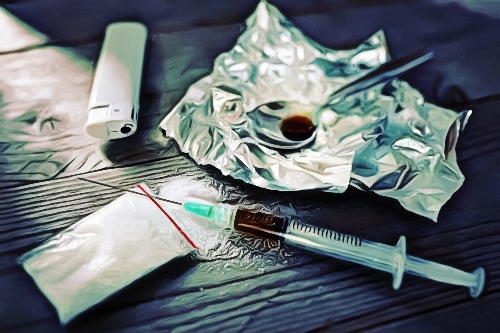Heroin, the opioid drug is known as smack, black tar, or junk in the streets, has had a long and interesting history. Heroin didn’t always have the reputation of being an infamous street drug. The drug itself was invented in 1874 and was first used as a form of pain medication, usually being mixed with cough medicine to provide relief. In fact, heroin was even used as an addiction treatment for morphine before its addictive properties became known.
The pharmaceutical company Bayer first used the term “heroin” as its brand name for the drug in 1898. After a few decades of legal use, heroin misuse rose rapidly, leading to rising cases of addiction. Only then did people realize just how addictive it can be. In 1924, the US government finally declared it as an illegal drug. However, despite being illegal up to this day, heroin use still continues in the United States and all over the world. In some countries like Canada, Netherlands, and the United Kingdom, the drug is available on a limited basis to treat addiction.
As heroin misuse still perseveres today, people need to be informed of just how dangerous the drug can be. How it affects the people who consume it and how long it stays in your system.
How Do People Use Heroin?
There are many ways to use heroin, including sniffing, snorting, smoking, or even by means of injecting. Some people mix heroin with crack cocaine, which is a practice known among users as speedballing. Perhaps the most dangerous method of use is by injecting the drug into the veins. This is an easier way to overdose, not to mention the additional risks of catching a disease using a dirty needle.

No matter how a person takes it, the drug gets to the brain fairly quickly, which increases the risk of addiction even more. Some people claim that a single use of the drug could immediately make you crave it and find it hard to stop yourself from using it again.
What Are the Effects of Heroin on the Body?
Users immediately feel a rush of good feelings and an overwhelming feeling of happiness. Then, for several hours, a “slowing down” effect will overtake your senses. This is because the drug actually blocks your body from getting pain messages and slows your heart rate and breathing. This is why heroin overdose is quite deadly, as it can cause you to stop breathing and die.
Short-Term Side Effects
A person under the influence of heroin will act and appear different than they normally do. Slurring or speaking slower than usual is a sign of someone who recently used heroin. Users typically have flushed skin and a shorter attention span. A person using heroin is also likely to experience impaired coordination, drowsiness, and euphoria.
Long-Term Side Effects
Someone suffering from addiction can also experience some severe long-term effect, such as:
- Depression
- Chronic constipation
- Skin infections
- Severe itching
- Vomiting
Other long-term side effects include:
- Lung infections
- Kidney or liver disease
- Higher risk of exposure to HIV
How Long Does Heroin Stay in Your System?
Heroin is a drug that doesn’t last long in the body, being quickly metabolized or broken down into metabolites and byproducts. The euphoric effects of the drug itself tend to last for only about 45 minutes to an hour.
Even though heroin is a fast-acting drug with a rapid half-life, it is the metabolites that have a tendency to stay in the body for quite some time. The actual time it takes for each individual depends on a number of factors, including:
- Age
- Height
- Weight
- Genetics
- Amount of drug taken
- The potency of the drug
- Rate of metabolism
- Body fat
- Hydration/diet
- Liver and kidney health
- Method of drug administration
Based on these factors, the rate at which the metabolites stay in the body can vary greatly, but it usually persists for a day or more. It is also important to note that it can generally be detected much longer in the systems of long-term, heavy users. This is because excessive use causes the drug to be stored in fatty tissues that take much longer to be flushed out than substances that are merely in the blood and other bodily fluids.
Testing for Heroin in the Body
Heroin is classified as a Schedule I drug, meaning that it’s a drug with no currently accepted medical use and a high potential for misuse. Because it is so fast-acting and has such a short half-life, it can sometimes be difficult to detect in standard drug screenings. In fact, it can take only 5-6 hours for the drug itself to become undetectable in body fluids.

On the other hand, the metabolites produced by the body due to the effects of the drug can be an excellent basis to detect the presence of heroin in the system. Most drug tests for heroin rely on these metabolites as they can last anywhere between one to four days in the body.
There are four different types of tests being utilized to test for heroin, and they all have different capabilities in detecting the metabolites:
- Blood: Up to six hours
- Urine: Up to three days
- Saliva: Up to 24 hours
- Hair: Up to 90 days
Blood and saliva tests aren’t often used for heroin due to the fact that this opioid has such a short half-life. On the other hand, the hair follicle test is the only drug test that is capable of detecting traces of the drug for longer than a week. While this may seem like a better option, it does take longer for those metabolites to manifest in a person’s hair follicles. There are also many possible factors that can interfere with hair tests.
Heroin Rehabilitation and Withdrawal
Since heroin is a fast-acting drug with effects that don’t last that long, it is much more susceptible to misuse and abuse. Heavy users tend to consume the drug more frequently so they can sustain that euphoric feeling they get every time they get high on the drug. But like any other form of drug abuse, addiction can be overcome through medication and rehabilitation.
If you have been using for a while, whether as a regular pattern, in binges, or if you have become dependent, you may want to know what to expect if you stop taking heroin and start having withdrawal symptoms. Physically, heroin withdrawal may feel like having a severe case of the flu. The usual flu-like symptoms that a user on withdrawal experiences include nausea, diarrhea, runny nose, tremors, fatigue, chills, and sweats.
During addiction recovery, the initial comedown of withdrawal can vary in time and intensity. Typically, withdrawal symptoms will begin six to 12 hours after the last dose, peaking within a day or two. This gradually subsides over a five to seven-day period. However, it’s possible that some heavy users may experience weeks or months of withdrawal symptoms.
Conclusion
Heroin has been plaguing the streets and poisoning people for hundreds of years. While the pull of the drug may be strong, it’s not impossible to recover from it. There are many treatment options for heroin addiction, such as medication, rehabilitation centers, and addiction therapy.
Sources:

